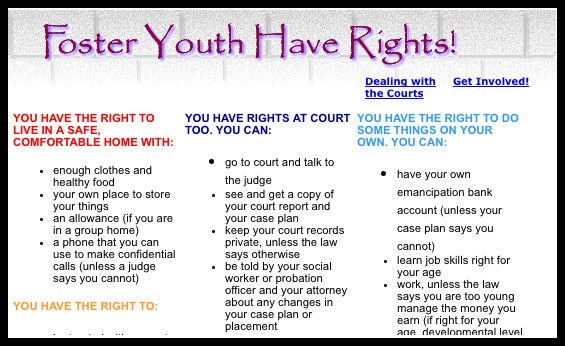The Los Angeles County Board of Supervisors unanimously approved a motion Tuesday that will create a bill of rights for children in LA County’s foster care system. The Foster Youth Bill of Rights will contain a list of services and resources, as well as a list of rights, for the county’s children and young adults in foster care.
“In supporting our children, the County has an obligation to ensure that our youth and resource families are reasonably informed of services, programs, and legislative mandates relating to foster parenting and adoption,” Supervisors Janice Hahn and Sheila Kuehl wrote in their motion.
The motion directs the Commission for Children and Families to form a working group made up of the Office of Child Protection, the Department of Children and Family Services, Probation, and other relevant county departments, current or former foster youth, and community stakeholder groups like Public Council, the Children’s Law Center, First 5 LA, and others.
A working group comprised of foster kids, advocates, and county workers will develop the bill of rights, which will include services, as well as federal, state, and local rights and legislative mandates benefitting foster youth and parents. The group is also directed to create a plan for ensuring that all current and former foster kids, caregivers, and social workers receive the bill of rights. The motion directs the group to look into areas that foster youth would benefit from guided support, like education, mental and physical health and well-being, housing, income, employment, dependency court proceedings, visitation, reunification, adoption, and immigration status. The group is to return to the board with a bill of rights in 120 days.
Many advocates, former foster youth, and foster caregivers spoke before the board in favor of the motion.
“Despite an “immense amount of resources” available to youth, “there’s no bridge in knowing what resources are out there,” said Evelyn Medina, a transitional development specialist at Children’s Institute. “This is a constant problem we have with our caregivers and youth—that they’re not aware of what’s available to them. They’re not aware of their rights.”
Sarah Boone, who heads a foster and adoption agency, Extraordinary Families, adopted three teenage boys from foster care, and described the difficulties of accessing services as a youth and as a foster parent. “I firmly believe that it is incumbent upon us as professionals to ensure that the system works for the youth and families that are most affected by us,” Boon said. “A bill of rights with the input of multiple foster youth and parents crafted in plain language that outlines legislative and program mandates, and clearly illustrates core services parents are entitled to, will be of significant benefit to children, youth, resource families, and LA County.”
The hope is that the bill of rights will increase transparency and ensure that kids and foster parents have necessary information “should they need to advocate for the services they are entitled to.”
Foster kids have special rights to transportation to school, help with transitioning from foster care to a permanent home, specialized mental health services, MediCal coverage until age 26, and more.
“The former foster youth who spoke at today’s meeting told us how frustrating it can be maneuvering the foster care system when you do not know your own rights or the resources available to you,” said Supervisor Hahn. “This bill of rights will be a way for both foster youth and foster parents to know every tool, service, and program that has been created to support them.”
The working group was to include at least two foster youth, but Supe. Hahn amended the motion to include six current and/or former foster youth after members of the National Foster Youth Institute suggested the change.
“To have only two youth on the working board is simply not enough to represent all of the experiences that all 35,000 [foster youth] go through,” said NFYI’s Brianna Smith.
Supe. Kuehl expressed her support of the amendment, saying, “We have a lot of commissions and boards and meetings and working groups about children, non of which have children on them.”

